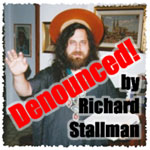
Denounced By Richard Stallman!
The denouncement has nothing to do with the free-platform restriction, about which RMS (late 1999) seems at best enthusiastic and at worst, ambivalent. RMS is opposed to the Free World Licence primarily because it is framed as a "shrink-wrap"/"click-wrap" software licence contract rather than as a pure copyright licence. Stallman's GNU GPL takes the form of a copyright licence. It is, in effect, a relaxation of the absolute legal power that copyright law provides to the creator of a work over the right to reproduce the work. The GNU GPL grants a licence, under copyright law, to use the software, and licence to copy it under certain conditions. As the licence is merely a unilateral relaxation of the powers provided by default by copyright law, it's legal scope can be no greater than those powers of "copying, distribution, and modification". In order to create a licence that contains terms and conditions that establish powers that are not already provided by default by copyright law, one must resort to a straight two-way commercial contract. Once you employ this form, you can insert almost any kind of clause with any kinds of powers. This is the form that most commercial "shrinkwrap" and "clickwrap" licences take. The GNU GPL actually employs both forms of licence. When you receive a copy of a program under the GNU GPL, you are receiving a straight unilateral copyright licence that relaxes only the powers of copyright law. However, if you choose to pass on copies to others, you enter into a contract that contains terms and conditions that circumscribe your behaviour, but only within the bounds of copyright law. The original framing of The Free World Licence was as a copyright licence (like the GNU GPL). The platform-specific restriction was to be implemented by including a condition that restricted the creation of derived works that could run on non-free platforms. This would have worked legally because it relied only on the power of copyright law to restrict the creation of derived works. Under this arrangement, it would not have been illegal to run the program on a non-free platform, but it would have been illegal to create an executable that could run on a non-free platform. Unfortunately, this approach had some problems. Not all computer programs are compiled. Some languages, such as PERL, are more or less interpreted. Other languages, such as Java, are compiled into a form that is so portable that it makes no sense to restrict the creation of "executables" capable of running on non-free platforms. One way out of this would be to restrict the copying of the software to free platforms, but this would destroy the ability for the software to be distributed through the internet, much of which is implemented by non-free platforms. These considerations motivated me to require that the licence contain an explicit clause restricting any form of execution of the software on non-free platforms. However, copyright law provides power only over the copying and modification of a work. Once someone actually has legally obtained a copy of a computer program, copyright law alone cannot restrict their right to run it. This meant that I could not frame The Free World Licence as a straight copyright licence AND include a legally binding clause that would restrict execution to free platforms only. The only alternative was to frame it as a commercial contract under which I could include terms of any kind. An additional incentive for employing contract form came from an analysis of the GNU GPL's no-warranty and no-liability clauses. It turns out that, because copyright law covers only copying and modification, a straight copyright licence such as the GNU GPL does not have the power to require the end-user to agree to these terms. The terms are therefore advisory only; they stand as warnings, not as binding conditions of use (for the GNU GPL software end user anyway; those who distribute become bound by the GPL contract). In contrast, a commercial contract may invoke these terms as binding conditions of use. While warnings may be a strong enough form to ward off most legal danger, my lawyer strongly advised me to employ the contract form so as to make the no-warranty and no-liability clauses unambiguously legally binding conditions of use. For this combination of reasons, I chose the commercial contract form over the pure copyright licence form. However, Richard Stallman is opposed to "shrink wrap" and "click wrap", and other such forms of "up-front" contract software licences because he says that they are an attempt "to deny the user the legal right to run a lawfully-acquired copy of the program." Consequently, he has said he would denounce the The Free World Licence. As an admirer of RMS, GNU and FSF, this is an outcome that I did not seek. However, I just can't get worked up enough about shrinkwrap licences to revert to a weaker legal form.
HOME Webmaster Copyright © Ross N. Williams 2000. All rights reserved. |
